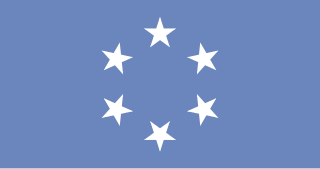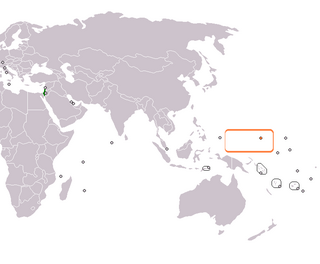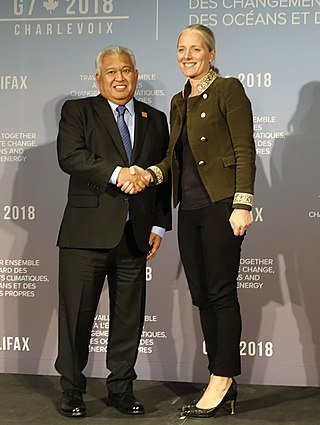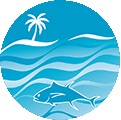
Micronesia is a subregion of Oceania, consisting of about 2,000 small islands in the Northwestern Pacific Ocean. It has a close shared cultural history with three other island regions: Maritime Southeast Asia to the west, Polynesia to the east, and Melanesia to the south—as well as with the wider community of Austronesian peoples.

Palau, officially the Republic of Palau, is an island country in the Micronesia subregion of Oceania in the western Pacific. The republic consists of approximately 340 islands and connects the western chain of the Caroline Islands with parts of the Federated States of Micronesia. It has a total area of 466 square kilometers (180 sq mi), making it one of the smallest countries in the world. The most populous island is Koror, home to the country's most populous city of the same name. The capital Ngerulmud is located on the largest island of Babeldaob, in Melekeok State. Palau shares maritime boundaries with international waters to the north, the Federated States of Micronesia to the east, Indonesia to the south, and the Philippines to the northwest.

The Trust Territory of the Pacific Islands (TTPI) was a United Nations trust territory in Micronesia administered by the United States from 1947 to 1994. The Imperial Japanese South Seas Mandate had been seized by the US during the Pacific War, as Japan had administered the territory since the League of Nations gave Japan mandate over the area from Imperial Germany after World War I. However, in the 1930s, Japan left the League of Nations, and then invaded additional lands. During World War II, military control of the islands was disputed, but by the end of the war the islands had come under control of the Allies. The Trust Territory of the Pacific was created to administer the islands as part of the United States, while still under the auspices of the United Nations. Most of the island groups in the territory became independent states, with some degree of ties kept with the United States: the Federated States of Micronesia, Marshall Islands and Palau are today independent states in a Compact of Free Association with the US, while the Northern Mariana Islands remain under US jurisdiction, as an unincorporated territory and commonwealth.

The Pacific Islands Forum (PIF) is an inter-governmental organization that aims to enhance cooperation among countries and territories of Oceania, including formation of a trade bloc and regional peacekeeping operations. It was founded in 1971 as the South Pacific Forum (SPF), and changed its name in 1999 to "Pacific Islands Forum", so as to be more inclusive of the Forum's Oceania-spanning membership of both north and south Pacific island countries, including Australia. It is a United Nations General Assembly observer.

The Compacts of Free Association (COFA) are international agreements establishing and governing the relationships of free association between the United States and the three Pacific Island sovereign states of the Federated States of Micronesia (FSM), the Republic of the Marshall Islands (RMI), and the Republic of Palau. As a result, these countries are sometimes known as the Freely Associated States (FASs). All three agreements next expire in 2043.
The Workforce Investment Act of 1998 was a United States federal law that was repealed and replaced by the 2014 Workforce Innovation and Opportunity Act.

The Federated States of Micronesia Football Association or FSMFA is the governing body of football in the Federated States of Micronesia, and of the national team. They are not a member of FIFA or a regional confederation.

The College of Micronesia-FSM (COM-FSM) is a public community college in the Federated States of Micronesia. It began operation in 1963 as the Micronesian Teacher Education Center.
Pacific Trade Invest, formerly known as the Pacific Islands Trade and Investment Commission (PITIC), is the leading trade and investment facilitation organisation in the Pacific Islands region with a specific focus on export facilitation, investment and tourism promotion.

Xavier High School is a private, Catholic coeducational college preparatory school high school run by the US East Province of the Society of Jesus on the island of Weno in Chuuk, Federated States of Micronesia. It was established by the Jesuits in 1952. It was the first high school in the Trust Territory of the Pacific Islands. Bishop Thomas Feeney, S.J., D.D. from the New York Province of the Society of Jesus originally envisioned a minor seminary to train local clergy. Soon after, Xavier Seminary became the first college preparatory school in the Western Pacific.
Micronesian Americans are Americans who are descended from people of the Federated States of Micronesia. According to the 2020 US Census, a total of 21,596 residents self-identified as having origins in the country, which consists of four states. More than half of these residents identified their origin as Chuuk State (12,464) with the rest as follows: 4,918 people from Pohnpei, 2,066 from Yap, and 2,148 people from Kosrae.

Workforce Innovation in Regional Economic Development (WIRED) was a project of the United States Department of Labor. It provided a new approach to workforce and economic development. Through the WIRED model, regions integrated economic and workforce development activities to demonstrate that talent development can drive economic transformation in regional economies across the United States.

Israel – Micronesia relations are diplomatic and other relations between the State of Israel and the Federated States of Micronesia. Israel was among the first countries to establish formal diplomatic relations with Micronesia.

Gerald M. Zackios is a Marshallese politician and diplomat. He was a member of the Legislature of the Marshall Islands (Nitijeļā) from 2000 until 2012. During this period he was Minister in Assistance to the President of Marshall Islands from 2000 until 2001 and Minister of Foreign Affairs from 2001 until 2007. He serves as the Ambassador of the Republic of the Marshall Islands to the United States since June 2016.

The Pacific Islands Forum Fisheries Agency (FFA) is an intergovernmental agency established in 1979 to facilitate regional co-operation and co-ordination on fisheries policies between its member states in order to achieve conservation and optimum utilisation of living marine resources, in particular highly migratory fish stocks, for the benefit of the peoples of the region, in particular the developing countries. The office campus is located in Honiara, Solomon Islands
One-stop career centers are public employment offices in the United States. They are workforce information and education offices set up by Workforce Investment Boards as directed by the Workforce Investment Act of 1998. The Workforce Investment Act was repealed and replaced by the 2014 Workforce Innovation and Opportunity Act with an annual budget of $3.3 billion.

The Workforce Innovation and Opportunity Act (WIOA) is a United States public law that replaced the previous Workforce Investment Act of 1998 (WIA) as the primary federal workforce development legislation to bring about increased coordination among federal workforce development and related programs.

Australia–Federated States of Micronesia relations are the bilateral relations between Australia and Federated States of Micronesia (FSM). Australia was the first country to start diplomatic relations with FSM in 1987 and is one of the four countries that have resident ambassadors to Micronesia. The two countries are members of the Pacific Islands Forum.

Marshall Islands High School is the main public high school located in Rita, Delap-Uliga-Djarrit, in Majuro atoll, the capital city of the Marshall Islands. Marshall Islands High School is the largest high school in the country of the Marshall Islands. MIHS is part of the Marshall Islands Public School System.

Australia – Marshall Islands are bilateral relations between Australia and the Marshall Islands. The Marshall Islands are located approximately halfway between Australia and Hawaii. The two countries are members of the Pacific Islands Forum.